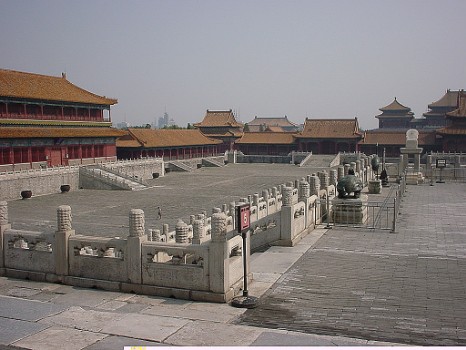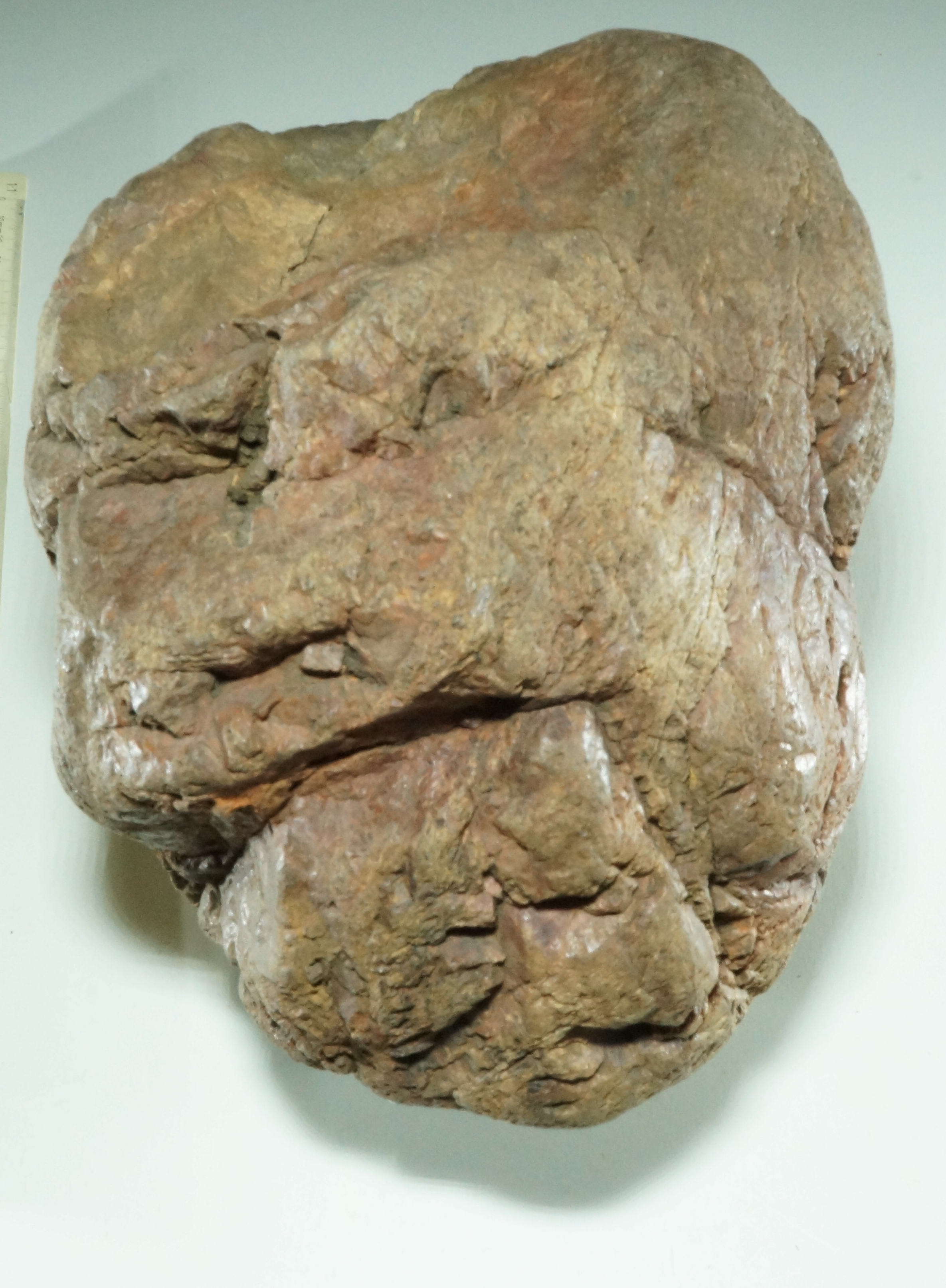.

Reading Kafka: Eine kaiserliche Botschaft (1917)
An Imperial Message
[This piece of prose was originally part of a longer text that was published posthumously under the title Beim Bau der Chinesischen Mauer [Building the Great Wall of China]. The reference to China is also recognisable in our piece. The fact that Kafka took it out of the larger context and gave it its own title indicates that it is about a separate topic. Moreover, Kafka apparently valued the text so much that he published it separately in the same year. As the text was written shortly after the Gallery and the Bridge, a connection with their themes is conceivable and this will be used here as a starting point for the interpretation. Our text could therefore also be about Kafka's "world in his head" and his "dreamlike inner life" and about the opposing attitudes and their consequences as described in Up in the Gallery].
[Franz Kafka: Drucke zu Lebzeiten, Ein Landarzt, S. 280-282 (1917/20)] [siehe]
Der Kaiser — so heisst es — hat Dir, dem Einzelnen, dem jämmerlichen Untertanen, dem winzig vor der kaiserlichen Sonne in die fernste Ferne geflüchteten Schatten, gerade Dir hat der Kaiser von seinem Sterbebett aus eine Botschaft gesendet.
The Emperor - so it is said - has sent You, the individual, the miserable subject, the tiny shadow fleeing from the imperial sun into the farthest distance, the Emperor has sent You of all people a message from his deathbed.
[In order to categorise the text correctly, it is important to understand the "so it is said". In the original context, it refers to the content of a "legend". Without this context, it clearly indicates that the following is not about facts or actual events, but about hearsay ranging from credible news to pure fantasy stories. The individual person addressed as " You" does not have to be understood as a single person in general, as in the legend, but it is more obvious to think of a specific individual person, who then clearly appears as acting subject at the end. A You, in other words, who imagines that the distant emperor has left him a message. The text may then also reflect the reaction of this You.
At first, everything is presented in the style of a legend or a fairy tale with poetic imagery and exaggerations that make the enormous distance between the emperor and the individual and the unbelievable nature of the event visible].
Den Boten hat er beim Bett niederknieen lassen und ihm die Botschaft ins Ohr zugeflüstert; so sehr war ihm an ihr gelegen, daß er sich sie noch ins Ohr wiedersagen liess. Durch Kopfnicken hat er die Richtigkeit des Gesagten bestätigt.
He has made the messenger kneel down by the bed and has whispered the message into his ear; he was so concerned about it that he had it repeated into his ear. By nodding his head, he confirmed that it was true.
[But then the description becomes almost soberly realistic. One gets the impression that the reservations of the You in view of the incredibility of the event are reflected here in the attempt to imagine in detail how this could actually happen. The messenger's kneeling down seems to indicate the submissiveness owed to the emperor, but the following context shows that it is probably due to the emperor's weakness, which is made clear here precisely by the detailed description of the whole process].
Und vor der ganzen Zuschauerschaft seines Todes — alle hindernden Wände werden niedergebrochen und auf den weit und hoch sich schwingenden Freitreppen stehen im Ring die Grossen des Reichs — vor allen diesen hat er den Boten abgefertigt.
And in front of the entire audience of his death - all the obstructing walls are broken down and the Great Ones of the Empire stand in a ring on the wide and high sweeping staircases - in front of all of them he has dispatched the messenger.
[At this point, however, where doubts about the Emperor's power could arise, there follows an insertion that perhaps only Kafka could have achieved. Suddenly the view widens and the entire power and greatness of the empire becomes visible in one swoop. There is an almost congenial scene in the film The Last Emperor where the two-year-old, who has just been appointed emperor, first rolls around on his throne like the baby he is and then climbs down and runs outside the palace, where the view suddenly widens to reveal the "Great Ones of the Empire" who have lined up in long rows to pay homage to him.
However, in Kafka's text, the death of the emperor is also mentioned in this scene and so one has the feeling that the emperor's weakness is being concealed when it is brashly stated that he has "dispatched" the messenger, which was somewhat different in the previous scene].
Der Bote hat sich gleich auf den Weg gemacht; ein kräftiger, ein unermüdlicher Mann; einmal diesen, einmal den andern Arm vorstreckend schafft er sich Bahn durch die Menge; findet er Widerstand, zeigt er auf die Brust, wo das Zeichen der Sonne ist; er kommt auch leicht vorwärts, wie kein anderer.
The messenger has set out straight away; a strong, indefatigable man; stretching out one arm and then the other, he makes his way through the crowd; if he meets resistance, he points to his chest, where the sign of the sun is; and so he moves forward easily, like no-one else.
[So all hope now rests on the messenger, which is also shown by the fact that every detail is obviously important: his physical constitution, the movement of his arms, the imperial sun on his chest. If you allow yourself to be carried by the movement of the sentence, you can feel the optimism at the end. (Cf. Up in the Gallery) A critical eye, however, cannot overlook the references to the crowd and the resistance, nor that the "'moves forward easily" at the end is, strictly speaking, considerably relativised by '"like no-one else"].
Aber die Menge ist so gross; ihre Wohnstätten nehmen kein Ende. Offnete sich freies Feld, wie würde er fliegen und bald wohl hörtest Du das herrliche Schlagen seiner Fäuste an Deiner Tür.
But the multitude is so great; there is no end to their dwellings. If a free field would open up, how he would fly and soon You would probably hear the marvellous hammering of his fists on Your door.
[Here now begins, typical of the "world in the head", a countermovement, introduced by "But" (as in the next sentence). What was previously only expressed as a subliminal fear is now openly articulated. The situation suddenly seems so hopeless that the critical consciousness flees into wishful thinking, which rather belongs to Kafka's "dreamlike inner life". The "how he would fly" can be understood as a metaphor for a very fast movement, but in connection with the idea that the messenger would "soon" reach the You in his "farthest distance", this is probably more of a dream, to which the "marvellous hammering" also fits. On the other hand, the hammering "fists" hardly belong in a dream, but rather in a nightmare. The confusion of the " You" is obvious and so the optimism that has been maintained with great effort turns into pessimism. This is also shown by the fact that the messenger is thrown back in time and space in the following sentence. He is still in the innermost palace, whereas before there was talk of the dwellings of the multitude].
Aber statt dessen, wie nutzlos müht er sich ab; immer noch zwängt er sich durch die Gemächer des innersten Palastes; niemals wird er sie überwinden; und gelänge ihm dies, nichts wäre gewonnen; die Treppen hinab müsste er sich kämpfen; und gelänge ihm dies, nichts wäre gewonnen; die Höfe wären zu durchmessen; und nach den Höfen der zweite umschliessende Palast; und wieder Treppen und Höfe; und wieder ein Palast; und so weiter durch Jahrtausende; und stürzte er endlich aus dem äussersten Tor — aber niemals, niemals kann es geschehen — liegt erst die Residenzstadt vor ihm, die Mitte der Welt, hochgeschüttet voll ihres Bodensatzes. Niemand dringt hier durch und gar mit der Botschaft eines Toten.
But instead, how uselessly he struggles; he still forces his way through the chambers of the innermost palace; never will he overcome them; and if he succeeded, nothing would be gained; he would have to fight his way down the stairs; and if he succeeded, nothing would be gained; the courtyards would have to be traversed; and after the courtyards the second enclosing palace; and again stairs and courtyards; and again a palace; and so on through thousands of years; and if he finally rushed out of the outermost gate - but never, never can it happen - only the imperial capital would lie before him, the centre of the world, piled high with its sediment. No one gets through here, least with the message from a dead man.
[This long sentence shows how much the description, despite the detailed information, is fuelled by emotions that border on despair. This can be seen in the long sequence of negative expressions that culminate in the emphatic "never, never". Exaggerations are also included, such as the messenger "forcing" his way through the presumably spacious chambers and "fighting his way" down the certainly wide stairs. Things become completely irrational when there is talk of "through thousands of years", similar to the theoretical consideration in the first part of Up in the Gallery, which opens up into "the infinite perspective of a drab future". So it all ends with a resigned view of the imperial capital, through which "no one gets through" and a message that is only that of "a dead man"].
— Du aber sitzt an Deinem Fenster und erträumst sie Dir, wenn der Abend kommt.
- But You sit at your window and dream it to Yourself when evening comes.
[Clearly set apart by the hyphen and the "but", the You here intervenes directly in the plot, succinctly and with determination. It is surprising how assertively the You simply brushes aside the whole "world in the head" and withdraws into the world of his dreams. It is not difficult to imagine Kafka at that time, retreating to the seclusion of Alchimistengässchen every evening and sitting at the window of his little house. As in Die Brücke (probably the first work that was written in the Alchimistengässchen), it is the evening atmosphere that inspires dreaming, there romantically enhanced by "towards evening in summer, darker rushed the brook"].

